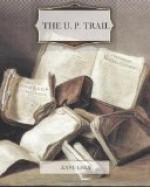It was this order that made King take so much time in ascending the bluff. Besides, he was a cowboy, used to riding, and could not climb well.
“Wal—I—shore—rustled—all the line—aboot heah,” he drawled, pantingly, as he threw lassoes and coils of rope at Neale’s feet.
Neale picked up some of the worn pieces. He looked dubious. “Is this all you could get?” he asked.
“Shore is. An’ thet includes what Casey rustled from the soldiers.”
“Help me knot these,” went on Neale.
“Wal, I reckon this heah time I’ll go down before you,” drawled King.
Neale laughed and looked curiously at his lineman. Back somewhere in Nebraska this cowboy from Texas had attached himself to Neale. They worked together; they had become friends. Larry Red King made no bones of the fact that Texas had grown too hot for him. He had been born with an itch to shoot. To Neale it seemed that King made too much of a service Neale had rendered—the mere matter of a helping hand. Still, there had been danger.
“Go down before me!” exclaimed Neale.
“I reckon,” replied King.
“You will not,” rejoined the other, bluntly. “I may not need you at all. What’s the sense of useless risk?”
“Wal, I’m goin’—else I throw up my job.”
“Oh, hell!” burst out Neale as he strained hard on a knot. Again he looked at his lineman, this time with something warmer than curiosity in his glance.
Larry Red King was tall, slim, hard as iron, and yet undeniably graceful in outline—a singularly handsome and picturesque cowboy with flaming hair and smooth, red face and eyes of flashing blue. From his belt swung a sheath holding a heavy gun.
“Wal, go ahaid,” added Neale, mimicking his comrade. “An’ I shore hope thet this heah time you-all get aboot enough of your job.”
One by one the engineers returned from different points along the wall, and they joined the group around Neale and King.
“Test that rope,” ordered General Lodge.
The long rope appeared to be amply strong. When King fastened one end round his body under his arms the question arose among the engineers, just as it had arisen for Neale, whether or not it was needful to let the lineman down before the surveyor. Henney, who superintended this sort of work, decided it was not necessary.
“I reckon I’ll go ahaid,” said King. Like all Texans of his type, Larry King was slow, easy, cool, careless. Moreover, he gave a singular impression of latent nerve, wildness, violence.
There seemed every assurance of a deadlock when General Lodge stepped forward and addressed his inquiry to Neale.
“Larry thinks the rope will break. So he wants to go first,” replied Neale.
There were broad smiles forthcoming, yet no one laughed. This was one of the thousands of strange human incidents that must be enacted in the building of the railroad. It might have been humorous, but it was big. It fixed the spirit and it foreshadowed events.




